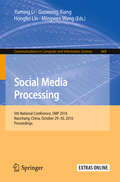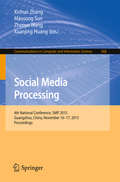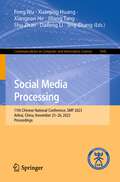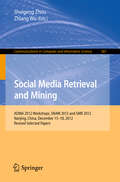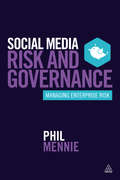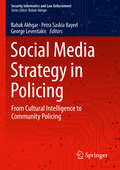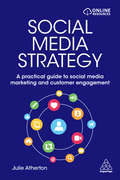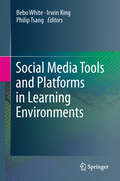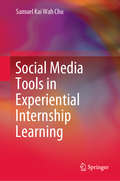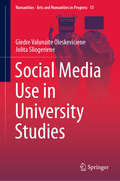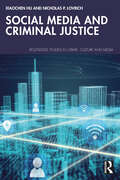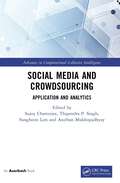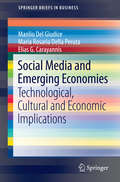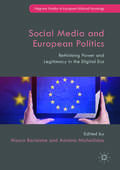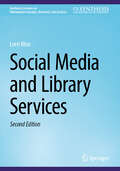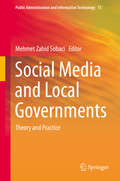- Table View
- List View
Social Media Processing
by Hongfei Lin Yuming Li Guoxiong Xiang Mingwen WangThis book constitutes the thoroughly refereed proceedings of the 5th National Conference of Social Media Processing, SMP 2016, held in Nanchang, China, in October 2016. The 24 revised full papers presented were carefully reviewed and selected from 109 submissions. The papers address issues such as: mining social media and applications; natural language processing; data mining; information retrieval; emergent social media processing problems.
Social Media Processing
by Maosong Sun Xuanjing Huang Xichun Zhang Zhenyu WangThis book constitutes the thoroughly refereed papers of the 4th National Conference of Social Media Processing, SMP 2015, held in Guangzhou, China, in November 2015. The 14 revised full papers and 9 short papers presented were carefully reviewed and selected from 105 submissions. The papers address issues such as: mining social media and applications; natural language processing; data mining; information retrieval; emergent social media processing problems.
Social Media Processing: 11th Chinese National Conference, SMP 2023, Anhui, China, November 23–26, 2023, Proceedings (Communications in Computer and Information Science #1945)
by Feng Wu Jing Zhang Xuanjing Huang Jiliang Tang Xiangnan He Shu Zhao Daifeng LiThis book constitutes the thoroughly refereed proceedings of the 11th Chinese National Conference of Social Media Processing, SMP 2023, held in Anhui, China, in November 2023.The 16 full papers presented were carefully reviewed and selected from 88 submissions. The papers are organized in the topical sections on knowledge representation and reasoning; knowledge acquisition and knowledge base construction; linked data, knowledge integration, and knowledge graph storage management; natural language understanding and semantic computing; knowledge graph applications; knowledge graph open resources.
Social Media Retrieval
by Jong-Seok Lee Kai Clüver Roelof Van Zwol Xian-Sheng Hua Naeem RamzanThis comprehensive text/reference examines in depth the synergy between multimedia content analysis, personalization, and next-generation networking. The book demonstrates how this integration can result in robust, personalized services that provide users with an improved multimedia-centric quality of experience. Each chapter offers a practical step-by-step walkthrough for a variety of concepts, components and technologies relating to the development of applications and services. Topics and features: introduces the fundamentals of social media retrieval, presenting the most important areas of research in this domain; examines the important topic of multimedia tagging in social environments, including geo-tagging; discusses issues of personalization and privacy in social media; reviews advances in encoding, compression and network architectures for the exchange of social media information; describes a range of applications related to social media.
Social Media Retrieval and Mining
by Shuigeng Zhou Zhiang WuThis book constitutes the refereed proceedings of the ADMA 2012 Workshops: The International Workshop on Social Network Analysis and Mining, SNAM 2012, and the International Workshop on Social Media Mining, Retrieval and Recommendation Technologies, SMR 2012, Nanjing, China, in December 2012. The 15 revised full papers presented were carefully reviewed and selected from numerous submissions. The papers are organized in topical sections on networks and graphs processing; social Web; social information diffusion; social image retrieval and visualization.
Social Media Risk and Governance
by Phil MennieFew topics are as pressing to policy makers, business leaders and the risk management community as the secure and compliant management of social media. Social Media Risk and Governance is a practical guide to the components and considerations which make up a good social media governance strategy, spanning both external communications channels such as Facebook, Twitter and LinkedIn, as well as enterprise social networks within an organization. Written by social media risk and governance expert Phil Mennie, Social Media Risk and Governance addresses the concepts professionals in information security, marketing, compliance and risk management need to take into account in their daily practice, guiding us through policy evaluation, planning on social media, information security and fraud risks, how to respond to a crisis or to archive data and more. Featuring examples from companies such as BP, MasterCard, Netflix, PwC, Silk Road UBS and Yelp, the book is designed to promote cross-functional working between professional users of social media, acknowledging the impact of these technologies across the business and the interaction of the various stakeholders when planning new activities to effectively harness the power of social media safely and successfully for their organization.
Social Media Storms: Empowering Leadership Beyond Crisis Management
by Pernille Rydén Muhammad Ismail Hossain Efthymia Kottika Vatroslav ŠkareThis fascinating new book explores the benefits and dynamics of social media storms and identifies the possible opportunities that they present for further engagement with customers. It provides actionable managerial advice on planning for, measuring, and innovatively navigating social media storms. Based on a sound theoretical background and illustrated by vivid real-life examples and case studies throughout every chapter, this book combines thorough explanations of the elements of business decision-making, market interaction, consumer psychology, branding, and business communication. In comparison to the existing literature, the book departs from the classical, but insufficient crisis communication management approaches to suggest novel frameworks and tools for empowering businesses, consumers, and broader societies in the digital age. Social Media Storms: Empowering Leadership Beyond Crisis Management provides advanced undergraduate and postgraduate digital marketing, marketing communications, strategy, and crisis management students with a comprehensive understanding of the social media storm phenomenon and helps marketing and communications professionals to leverage the opportunities that social media storms are bringing.
Social Media Strategy in Policing: From Cultural Intelligence to Community Policing (Security Informatics and Law Enforcement)
by Babak Akhgar Petra Saskia Bayerl George LeventakisThis book addresses conceptual and practical issues pertinent to the creation and realization of social media strategies within law enforcement agencies. The book provides readers with practical methods, frameworks, and structures for understanding social media discourses within the operational remit of police forces and first responders in communities and areas of concern. This title - bridging the gap in social media and policing literature - explores and explains the role social media can play as a communication, investigation, and direct engagement tool. It is authored by a rich mix of global contributors from across the landscape of academia, policing and experts in government policy and private industry. Presents an applied look into social media strategies within law enforcement;Explores the latest developments in social media as it relates to community policing and cultural intelligence; Includes contributions and case studies from global leaders in academia, industry, and government.
Social Media Strategy: A Practical Guide to Social Media Marketing and Customer Engagement
by Julie AthertonSocial Media Strategy provides a simple, structured way to create integrated customer engagement and social media campaigns that work. Organizations often talk of digital planning but struggle to know which channels to invest in, how to integrate them with content marketing activity, or fail to develop measurable outputs that align with business objectives. This book provides a clear road map for efficient planning, deliverance and financial accountability of social media's contribution to the business.Social Media Strategy delivers practical guidance such as identifying and targeting audience segments, methods of two-way community engagement, reputation management, being present on the right channels, and driving action through influencers. It also identifies the relevant tools and platforms to audit, track and measure business impact and customer engagement. With example templates, interviews and global case studies including National Geographic, TUI, Dreams Beds and Tiny Giant, this professional guide delivers a long-term solution for maximizing social media led business development.
Social Media Strategy: A Practical Guide to Social Media Marketing and Customer Engagement
by Julie AthertonSocial media marketing is no longer optional. This book unpacks the winning formula for effective social media marketing complete with comprehensive updates and latest developments.Integrated marketing and PR strategies are a requirement for all businesses but with the explosion of social media and content marketing many organizations still struggle to know which channels to invest in and how to maximize their impact. Social Media Strategy gives clear guidance with a simple structured approach to executing campaigns that work. It provides a blueprint for planning, delivering and measuring social media's contribution to your business through:- Identifying and targeting audience segments - Maximizing social search - Enhanced reputation management - Managing a diversified influencer portfolio - Selecting the right channels for organic and paid social - Creating a process and structure to improve efficiencies- Using appropriate technology including AIWith explanations of best-practice tools and practical downloadable templates, this new edition includes new and updated interviews and case studies from industry leaders, influencers and brands including TUI, Greggs, Lego, Ryan Air, National Geographic and others. Social Media Strategy delivers a long-term solution for maximizing social media-led business development.
Social Media Success for Every Brand: The Five StoryBrand Pillars That Turn Posts Into Profits (The StoryBrand Guides)
by Claire Diaz-OrtizBased on Donald Miller&’s bestselling book?Building a StoryBrand, Claire Diaz-Ortiz applies the seven principles of the StoryBrand Framework to help you build an effective, long-lasting social media plan for your brand.Most business owners are blindly guessing at their social media strategy, and it&’s costing them time and money. This book teaches you how to incorporate the StoryBrand 7-Part Framework into their social media channels to increase engagement and see better results.In Social Media Success for Every Brand, you will understand exactly what they need to do with their social media to drive growth to their organization through the practical guidance of the five-point SHARE model:StoryHowAudienceReachExcellenceSocial Media Success for Every Brand does not require you to be familiar with?Building a StoryBrand,?but provides enough foundation to prepare you for practical success with their social media content.Together with the StoryBrand Framework, Claire&’s SHARE model will help boost customer engagement and grow the organization&’s brand awareness and revenues.
Social Media Theory and Communications Practice
by Whitney LehmannFusing the academic with the applied, this book provides a comprehensive introduction to social media for future communications professionals. While most social media texts approach the subject through either a theoretical, scholarly lens or a professional, practical lens, this text offers a much-needed linkage of theory to the practical tactics employed by social media communicators. Concise and conversational chapters break down the basics of both social media theory and practice and are complemented by sidebars written by scholars and industry professionals, chapter summaries and end-of-chapter exercises. This book is ideal for introductory social media courses in communication, public relations and mass communication departments, as well as courses in digital media and public relations. Online resources include social media writing templates, sample posts and content calendar templates. Please visit www.routledge.com/9781032185873.
Social Media Theory and Communications Practice
by Whitney LehmannFusing the academic with the applied, this book provides a comprehensive introduction to social media for future communications professionals.While most social media texts approach the subject through either a theoretical, scholarly lens or a professional, practical lens, this text offers a much-needed linkage of theory to the practical tactics employed by social media communicators. Concise and conversational chapters break down the basics of both social media theory and practice and are complemented by sidebars written by scholars and industry professionals, chapter summaries and end-of-chapter exercises.This book is ideal for introductory social media courses in communication, public relations and mass communication departments, as well as courses in digital media and public relations.Online resources include social media writing templates, sample posts and content calendar templates. Please visit www.routledge.com/9781032185873.
Social Media Tools and Platforms in Learning Environments
by Irwin King Bebo White Philip TsangOnline social media have transformed the face of human interaction in the 21st century. Wikis, blogs, online groups and forums, podcasts, virtual worlds, and social tagging are but a few of the applications enabling innovative behaviors that support acquisition, access, manipulation, retrieval, and visualization of information. It is, therefore, no surprise that educational practitioners and theorists have begun to explore how social media can be harnessed to describe and implement new paradigms for communication, learning, and education. The editors' goal in publishing this book was to identify original research on the application of online social media and related technologies in education as well as emerging applications in Web technologies that could provide and shape future educational platforms. The selected contributions deal with questions such as how social media can truly enrich and enhance learning and teaching experiences in ways not otherwise possible; how learning can be integrated in a distributed and ubiquitous social computing environment; or what theories, paradigms, and models are applicable for the support of social computing in education. Researchers in education or educational software will find interesting and sometimes provocative chapters on paradigms and methodologies, virtual and mobile learning spaces, and assessment and social factors. Practitioners in these fields will benefit from an additional section devoted to case studies and first experience reports.
Social Media Tools in Experiential Internship Learning
by Samuel Kai ChuThis book describes how a support structure can be built to enhance peer-to-peer (and also students-to-lecturers) communication and support. It informs lecturers on how they can decide if they should adopt one or more social media tools to facilitate students’ learning, communication, and support for an internship program. This book introduces a participatory design approach that can help develop a pedagogy that will make good use of social media tools on internship learning. It presents a framework for experiential internship learning, integrating helpful educational practices such as participatory design approach and the use of social media.
Social Media Use in University Studies (Numanities - Arts and Humanities in Progress #13)
by Jolita Sliogeriene Giedre Valunaite OleskevicieneThis book highlights the phenomenon of social media use in university studies based on its participants’ lived experience. It will appeal both to academics and practitioners interested in the human factors in the study environments saturated with technologies of social media. This book reveals multiple, sometimes contradictory dimensions of the phenomenon. The contradictions acquire a binary Janus-faced characteristic of uncertainty and paradox. Social media use in university studies also causes changes in experiencing time, space and relations. Teacher research participants sometimes perceive their time as stress or an additional load, which shows that social media use in university studies demands a new approach to teacher workload and its regulation. There is also the necessity of the sensitive democratic teacher—student pedagogical relationship. This book proves that the pedagogical relationship and human creativity essentially belong to the human living world and are still at the heart of the technological “cyborgian” existence.
Social Media Warfare: Equal Weapons for All
by Michael ErbschloeSocial media applications can be weaponized with very little skill. Social media warfare has become a burden that nation states, government agencies, and corporations need to face. To address the social media warfare threat in a reasonable manner that reduces uncertainty requires dedication and attention over a very long-term. To stay secure, they need to develop the capability to defend against social media warfare attacks. Addressing unconventional warfare strategies and tactics takes time and experience, plus planning and dedication. This book will help managers develop a sound understanding of how social media warfare can impact their nation or their organization.
Social Media and Criminal Justice (Routledge Studies in Crime, Culture and Media)
by Nicholas P. Lovrich Xiaochen HuDiscussing social media-related scholarship found in criminology, legal studies, policing, courts, corrections, victimization, and crime prevention, this book presents the current state of our knowledge on the impact of social media and the major sociological frameworks employed to study the U.S. justice system.Building a theoretical framework for the study of social media and criminal justice in each chapter, the chapters provide a systematic reflection of extant research on social media in cybercrime, operations of courts, administration of institutional and community corrections, law enforcement, and crime prevention. The book fills the gap between the contemporary state of knowledge regarding social media and criminal justice with respect to both empirical evidence and types of sociological frameworks being employed to explore and identify the societal costs and benefits of our growing dependence upon social media. In addition to providing an up-to-date overview of our current state of knowledge, this book highlights important areas of future research, wherein the benefits of social media can be expanded and the negative aspects of its broadening use can be minimized.Social Media and Criminal Justice will be of interest to students, scholars and practitioners in the areas of judicial administration, corrections management, law enforcement, and criminal justice-engaged community-based nonprofit organizations involved in court-referred treatment and/or active collaboration with local law enforcement agencies.
Social Media and Crowdsourcing: Application and Analytics (Advances in Computational Collective Intelligence)
by Anirban Mukhopadhyay Thipendra P. Singh Sujoy Chatterjee Sunghoon LimSocial media and crowdsourcing are important tools for solving complex problems. The benefit of crowdsourcing is that it leverages the power of human intelligence cost effectively and with less time. Social Media and Crowdsourcing: Application and Analytics examines the concepts of social media and crowdsourcing as well as their analytical aspects. It explores how these technologies contribute to the real world and examines such applications as promoting social good, agriculture, healthcare, tourism, disaster management, education, crime control, and cultural heritage. The book also looks at ethical issues in crowdsourcing and future scenarios and challenges for policy. Highlights of the book include the following: A crowdsourcing application in agriculture Crowdsourcing outline for a contemporary aided medicinal backup system Crowdsourcing-based recommendation in the tourism industry Crowdsourcing mechanisms for reviving cultural heritage Expanding the overarching concept of utilizing social media and crowdsourcing to solve various real-life problems, this book discusses how to bring together the wisdom of crowds for various decision-making problems in agriculture, disaster management, and healthcare. It addresses the various ethical issues arising out of various crowdsourcing-based applications. It puts forward diverse methodologies to involve crowdsourcing in education to implement new strategies to enhance learning outcomes. This book also addresses various problem-solving techniques for recommender applications in the travel and tourism industry. Providing a systematic discussion of the many sectors using crowdsourcing as an essential part of social innovation, this book is a theoretical and methodological look at the application of social media.
Social Media and Electronic Commerce Law
by Alan DavidsonThe ever-evolving nature of electronic commerce and social media continues to challenge the capacity of the courts to respond to privacy and security violations in 'cyberlaw'. Social Media and Electronic Commerce Law is designed to provide students and legal practitioners with a thorough and engaging exploration of the laws, regulations and grey areas of commerce via online platforms. This new edition has been thoroughly revised to address changes in legislation and recent court judgments, and to reflect the dynamic sphere of social media. New chapters focus on internet and e-commerce law regarding social media, P2P file sharing, Cloud computing and workplace issues, with an emphasis on data security made particularly relevant by the proliferation of hacking incidents. Written in an accessible style, Social Media and Electronic Commerce Law investigates the challenges facing legal practitioners and commercial parties in this dynamic field, as well as the underlying legal theory that governs it.
Social Media and Emerging Economies
by Maria Rosaria Della Peruta Manlio Del Giudice Elias G. CarayannisHow have social media in emerging economies evolved differently from the rest of the world? According to studies and anecdotal evidence, innovations in the use of social media tools occur more frequently in emerging economies than they do in developed markets. The aim of this volume is to show that in emerging regions (such as China, India, and South America) where the participation of stakeholders in the circuit of social media is more active (i. e. , greater frequency of contacts and creativity in the elaboration of contents), organizations not only are involved in a set of exchange relations with other social actors but are also embedded in a network of dynamic relationships. The authors utilize social network analysis to determine how entrepreneurs in emerging economies identify their most beneficial social contacts and use those contacts to leverage the resources needed for their enterprises, revealing new insights on the process of business creation and economic development in the networked age.
Social Media and European Politics
by Mauro Barisione Asimina MichailidouThis volume investigates the role of social media in European politics in changing the focus, frames and actors of public discourse around the EU decision-making process. Throughout the collection, the contributors test the hypothesis that the internet and social media are promoting a structural transformation of European public spheres which goes well beyond previously known processes of mediatisation of EU politics. This transformation addresses more fundamental challenges in terms of changing power relations, through processes of active citizen empowerment and exertion of digitally networked counter-power by civil society, news media, and political actors, as well as rising contestation of representative legitimacy of the EU institutions. Social Media and European Politics offers a comprehensive approach to the analysis of political agency and social media in European Union politics, by bringing together scholarly works from the fields of public sphere theory, digital media, political networks, journalism studies, euroscepticism, political activism and social movements, political parties and election campaigning, public opinion and audience studies.
Social Media and Everyday Life in South Africa (Routledge Contemporary South Africa)
by Tanja E BoschThis book explores how social media is used in South Africa, through a range of case studies exploring various social networking sites and applications. This volume explores how, over the past decade, social media platforms have deeply penetrated the fabric of everyday life. The author considers South Africans’ use of wearable tech and use of online health and sports tracking systems via mobile phones within the broader context of the digital data economy. The author also focuses on the dating app Tinder, to show how people negotiate and redefine intimacy through the practice of online dating via strategic performances in pursuit of love, sex and intimacy. The book concludes with the use of Facebook and Twitter for social activism (e.g. Fees Must Fall), as well as networked community building as in the case of the #ImStaying movement. This book will be of interest to social media academics and students, as well as anyone interested in social media, politics and cultural life in South Africa.
Social Media and Library Services (Synthesis Lectures on Information Concepts, Retrieval, and Services)
by Lorri MonThis Second Edition presents research, theory, and practical applications for social media and libraries, providing insights into the life of the social library. Readers are introduced to the features of social sites that can be leveraged to create a unique and diversified library social media presence. The author explains how social media sites and services can be assessed based on a variety of attributes, such as visibility, voice, interaction, reach, impact, and reputation. This new edition addresses the changes in the social media landscape since the first edition was published as well as new issues that impact how libraries use social media. The author also addresses new issues that are impacting how libraries use social media, including changing algorithms, artificial intelligence, misinformation, privacy, moderation, policy issues, and more.
Social Media and Local Governments
by Mehmet Zahid SobaciToday, social media have attracted the attention of political actors and administrative institutions to inform citizens as a prerequisite of open and transparent administration, deliver public services, contact stakeholders, revitalize democracy, encourage the cross-agency cooperation, and contribute to knowledge management. In this context, the social media tools can contribute to the emergence of citizen-oriented, open, transparent and participatory public administration. Taking advantage of the opportunities offered by social media is not limited to central government. Local governments deploy internet-based innovative technologies that complement traditional methods in implementing different functions. This book focuses on the relationship between the local governments and social media, deals with the change that social media have caused in the organization, understanding of service provision, performance of local governments and in the relationships between local governments and their partners, and aims to advance our theoretical and empirical understanding of the growing use of social media by local governments. This book will be of interest to researchers and students in e-government, public administration, political science, communication, information science, and social media. Government officials and public managers will also find practical use recommendations for social media in several aspects of local governance
